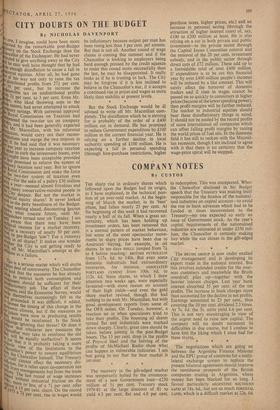CITY DOUBTS ON THE BUDGET
DAVENPORT
:11 By NICHOLAS °Ile enough disinflation to cause a fall in
tidustrial equities. After all, he had gone
ril r t ° °Pe, I imagine, could have been more rPrised by the remarkable post-Budget A h verY on the Stock Exchange than the
ic" tended of the Exchequer. He had never tended to give anything away to the City he may well have thought that he had
n 0, his way not only to raise the tax Ivo distributed profits from 27-1 per cent. (1.3co per cent., but to increase the rn,,,"ensible tax on undistributed profits 4-fig' 24 per cent. to 3 per cent. Even Mr. "et, who liked throwing sops to the 4de unions, had never attempted to attack 130 celiPnanY savings. With universal approval o„L‘cyal Commission on Taxation had
pr,;`,"emned the two-tier tax on company
in,,"'tts, and it had been generally expected rep"ht, Mr. Macmillan, with his reformist the„.,`a,ti.on, would carry out their recom- 04equations and merge the two iniposts in lor'„If he had said that it was necessary is "'le Year to increase company taxation that to to curb the investment boom, even li:thrhight have been acceptable provided con;'ad promised to reform the system of the bil"hY taxation next year. But to ignore Of ,rYal Commission and make the farce ivet`lle two-tier system of taxation even extra the sake of a paltry £30 million 414(14 a Year—seemed almost frivolous and the
made conservative-minded people in
ihd L-ItY despair. But not the market in baestrial equity shares! It never looked ii ‘,v to the petty beastliness of the Budget. 'Nem soaring ahead, discounting heaven 1(148 silowhat roseate future, until Mr. , well ..ev turned sour on Tuesday. I am tee}, aware that there may have been 0 lintlical reasons for a market recovery. fro,'?r a recovery of nearly 50 per cent. boo',,,1t.5 Pre-Budget 'low'? For a runaway Whe"'n, 'll oil shares? It makes one wonder Writ:Her the City is not getting ready to ING.elf Mr. Macmillan's attempt at dis- uch as a failure.
* * *
This • kr 's a serious matter which will excite ha-•t:it deal of controversy. The Chancellor take 6itid that the measures he has already irlys to restrict both consumption and /' IN-ellment should be sufficient for their thel,tinationary job. The effect of these hialt:cres, said the Economic Survey, would year themselves increasingly felt as the le f° Proceeded. It was difficult, it added, resee the timing of this change in the 14r jc;lie climate, but if the measures ,so the,'4'eu were slow in producing results 4,, would be reinforced. Is the Stock beic,-"h8e ignoring that threat? Or does it Ch've that whatever new measures the the4rIcellor may take to reinforce the old to /' will be equally ineffective? It seems teal?* that it is probably taking a more Chatnstic view of the limitations to the thiChnlor's power to restore equilibrium by the Chancellor himself. The Treasury illft:t;self cannot effect the necessary ettlytf'°n, for t relies Upon co-operation not , utii`r°111 managements but from the trade L' Oass-LS' The last round of wage increases tats without industrial friction on offer again, More or less, of a 74 per cent. o er °1955ial.,5 Per cent. claim. On the record - ' II per cent. rise in wages would
be inflationary because output per man has been rising less than 3 percent. per annum. But that is not all. Another round of wage claims is coming this summer and if the Chancellor is looking to employers being hard enough pressed by the Credit squeeze to resist this round more successfully than the last, he may be disappointed. It really looks as if he is trusting to luck. The City may be forgiven if it is less inclined to believe in the Chancellor's star, if it accepts a continued rise in prices and wages as more likely than stability at present levels.
But the Stock Exchange would be ill advised to write off Mr. Macmillan com- pletely. The disinflation which he is striving for is probably of the order of a £400 million cut in demand. He has promised to reduce Government expenditure by £100 million in the current financial year. He is relying on a further decline in local authority spending of £100 million. He is expecting a fall in personal spending (through hire-purchase restrictions, higher
purchase taxes, higher prices, etc.) and an increase in personal saving (through the attraction of higher interest rates) of, say, £100 to £200 million at least. He is also relying on a cut in both private and public investment—in the private sector through the Capital Issues Committee control and the removal of the 20 per cent. investment subsidy, and in the public sector through direct cuts of £72 million. These add up to a formidable total of over £400 million. If expenditure is to be cut this financial year by over £400 million people's incomes will be reduced by a like amount. This will surely affect the turnover of domestic traders and if rises in wages cannot be passed on so quickly to consumers in higher prices (because of the lower spending power), then profit margins will be further reduced. The market in industrial equities should bear these disinflationary things in mind. It should not be misled by the record profits of some international oil companies which can offset falling profit margins by raising the world prices of fuel oils. In the domestic field it has still to reckon with the Macmil- lan recession, though I am inclined to agree with it that there is no certainty that the wage-price spiral will be stopped.










































 Previous page
Previous page